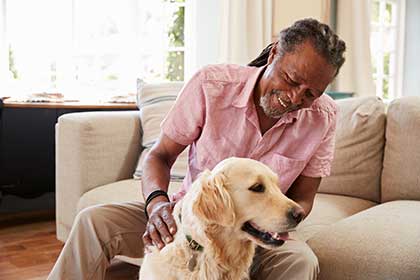Loneliness is a feeling that we all have experienced, and you have no doubt felt it yourself at times, whether you’re getting emotional about your age or simply having the sense that no one really understands you or wants to spend time with you. Loneliness is, perhaps ironically, a universal experience. Being unable to share your joyous moments with others makes the world seem a little grayer and less fulfilling.
MedBox: Never Sort Medications Again
However, there are times when being alone is not a bad thing. It serves as a reminder that something is missing in your life, and can encourage you to prioritize your well-being, including finding activities that can bring you happiness.
Sometimes, the feeling of loneliness can act as a warning sign. For survival and development, everyone needs social ties. But as people age, they spend a lot more time by themselves. Seniors who live alone are much more exposed to depression and social isolation, which can cause harm to their mental and physical well-being. According to surveys, social isolation and loneliness raise the chance of developing conditions like heart disease, anxiety, and neurodegeneration (which can lead to increased risk for memory loss and dementia).
You may be at increased risk of feeling isolated or lonely if you live alone, have limited social or financial support, have trouble hearing, live in a rural area, or have recently experienced major life events such as illness or death of a spouse. Fortunately, there are things you can do to protect yourself or a loved one from the damaging consequences of social isolation and loneliness.
Social Clubs and Community Groups
One of the best approaches to prevent loneliness and social isolation among seniors is to join social clubs and community groups. You can check with nearby senior centers to see if they hold any events you might be interested in. Another possibility is to explore senior clubs online, where you can find lots of information on different regional events.
Seniors have the chance to connect with others who have similar interests through clubs. Being part of a club also gives you regular events to look forward to. In addition, they offer an opportunity for you to get out of your home and add more structure to your week. Research has shown that adults who participate in senior center activities have a delay in the onset of chronic diseases and improve their sense of well-being.
Increasing Socialization
As you grow older, socialization doesn’t happen quite as often as it used to. This means you may need to be more proactive and prepare for social events ahead of time.
Go for a drive or plan a game night to meet with loved ones in person. Thanks to modern technology, long-distance relationships are easier, and the right kind of technology can help elders feel less socially isolated. This may mean calling a friend or a family relative, even one you may not have talked to recently. Stay in touch through a telephone call or video chat. Even family conference calls can be planned regularly. Everyone is more likely to follow through when there is a clear plan.
Get a Pet or a Plant

Animals make great companions. Nurturing and looking after a pet can be quite therapeutic, assuming the senior is willing to make the commitment. Try speaking with your local animal shelter to find out whether there are any suitable pets available for adoption. Alternatively, consider volunteering at a nearby rescue center for a less time-consuming option.
Studies show that spending quality time with a furry, four-legged friend can reduce anxiety and sadness, thus making you happier.
You can also get a plant or take up gardening to satisfy your desire to be nurturing.
MedBox: Simplify Your Prescription Routine
Schedule a Weekend Away
It might be really distressing to be unable to travel far or go on a family vacation. But going out is important, so try to schedule a weekend getaway from time to time. This will give you the opportunity to interact with others, whether it be through friends, colleagues, or a senior shuttle service.
Look into the transportation options in your area. Many places offer transportation services for seniors. If you wish to use public transportation, most cities offer discounted prices to senior citizens.
Find an Activity You Enjoy
It’s always fun and enjoyable to restart an old activity or learn something new. Community classes may be fun and educational and allow you to meet others with similar interests. Some outdoor classes may also allow you to stay physically active.
Dine With Others
The social isolation that older people feel during meals may be one of the worst feelings they experience. Eating is traditionally a group activity, so eating by yourself often can make you feel especially lonely.
Eat with others as much as possible to avoid social isolation. Attend a dinner organized by a local church or community center, or invite friends over for supper. Going out to eat occasionally can also make you feel less socially isolated.
Counseling
Your mental health may suffer if you are socially isolated. Mental health concerns such as sadness or anxiety can lead to or worsen social isolation. Social isolation among seniors has major repercussions, yet it is avoidable.
Counseling might be a good option whenever your mental health is interfering with your ability to function on a daily basis. A client-therapist connection can be beneficial for seniors who struggle with depression or loneliness. Everyone wants to be seen, heard, and acknowledged, so it can be helpful to form a connection with someone who can listen without passing judgment.
You Are Not Alone in This
Social networks have a tendency to contract as we grow older. But you are not alone in having to deal with social isolation. Although staying in touch can feel more difficult as we age, there are a variety of methods available to alleviate loneliness.
Join a cause or get involved in your community. You can also introduce yourself to your neighbors or call a friend. You will be well on your way to a positive and healthy lifestyle if you focus on the recommendations above and remind yourself that you are not the only one who feels alone. Remember, you can relieve someone else’s sadness when you interact with others, so it can be a win-win situation when you take active steps to address feelings of loneliness.


